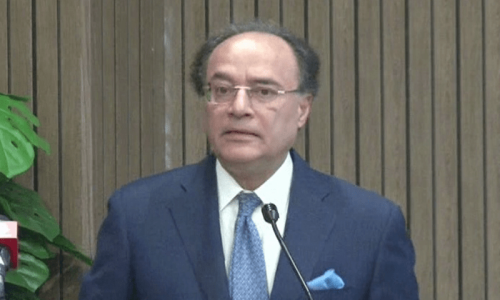
KARACHI: A lifetime achievement award was conferred on eminent historian, researcher and Jinnah scholar Prof Sharif Al Mujahid by the Jinnah Society at Karachi Gymkhana on Friday evening.
Despite the age factor Prof Mujahid, as he always does, delivered an eloquent speech on the occasion. He first thanked the organisers of the event and the guests who attended it for showering affection on him and then talked about his favourite subject: M.A. Jinnah. But he developed his thesis by saying that he’s going to focus his address on Iqbal and Jinnah. He said our national poet Iqbal was always rawan and dawan in his unbounded poetry. In that context he quoted the couplet:
Dasht to dasht hain darya bhi na chhore hum ne
Behr-i-zulmaat mein dora diyey ghorey hum ne
[Not just land, we covered the vast expanse of the rivers And rode our horses into the darkest of worlds]
But, he said, when it came to compact concepts Iqbal was always precise. To back his argument he read the following two lines:
Aik hee saff mein khare ho gaey Mahmood o Ayaz
Na koi banda raha aur na koi banda nawaz
[Mehmood and Ayaz stood shoulder to shoulder There was no master and no servant]
This made Prof Mujahid infer that Iqbal’s poetry made secularism the social voice of direct democracy in Pakistan. Therefore secularism had a social space in explaining direct democracy in contemporaneous Islam.
Prof Mujahid pointed out that while welcoming limited modernism in Islam in the late 19th century by Sir Syed, Iqbal emphasised that Islam was secular in the roots of its being and that it represented one side of the medallion –– one side is secularism and the other is Islam. That meant that there were two sides of the medallion which were interlinked. The problem was how to separate one side from the other.
Prof Mujahid said in Jinnah’s discourse of the Two-Nation Theory, the Quaid defined Hindus and Muslims as two nations with an inalienable right to self-determination as [is evident] in his address to the UP League leaders in 1937, address at the League session at Lucknow in 1937 and in his presidential address to the Lahore session. The last two of these were described by Gandhi as “war of words”. When Gandhi described Indian Muslims as no entity except “a mere body of converts” Jinnah shot back on Sept 17, 1944. In his letter to Gandhi [he gave] the following definition of Muslim nationhood:
“We maintain and hold that Muslims and Hindus are two major nations by definition. We are a nation of a hundred million and, what is more, we are a nation with our own distinctive culture and civilisation, language and literature, arts and architecture, names and nomenclature, sense of value and proportion, legal laws and moral codes, customs and calendar, history and traditions, aptitude and ambitions. In short, we have our own distinctive outlook on life and of life. By all canons of international law, we are a nation.”
Prof Mujahid stressed, though, that we should allow the issue of secular or Islamic state to be settled by time and memory. Instead, we should put our efforts and energies into productive activities such as nation building with unity, faith and discipline.
Earlier, Dawn’s Readers Editor Muhammad Ali Siddiqi said Prof Mujahid was his teacher and mentor. He had known him for more than 60 years. He recalled the time when the professor used to write for Dawn, and the time when there was no Google and he used to consult the professor for answers to the questions pertaining to the freedom movement. He said Prof Mujahid had written for Dawn for 50 years, and if one were to collect his articles that he penned for occasions such as March 23, Aug 14 and Sept 11, they would run into the thousands; and if a book were to be published, it would run into several volumes.
Mr Siddiqi also remembered the time when Prof Mujahid told him about the March 23 resolution and how it came to be called Pakistan Day. In his concluding remarks he said three things were part of his life: Jinnah, Dawn and Prof Mujahid.
President Jinnah Society Liaquat Merchant said he had known Prof Mujahid for the last 15 years, and had a picture of him taken at his house from 1999 when the professor came to the launch of the film Jinnah at the invitation of Prof Akbar Ahmed. He then talked about the books on Jinnah that he had co-authored with Prof Mujahid. They included the second and third editions of Jinnah Anthology, English version and its Urdu translation of Quotes from the Quaid and mentioned that they had now decided to publish the fourth edition of the anthology. He added the Jinnah Society conferred awards on individuals who rendered outstanding services to Pakistan, and it was for the first time that a lifetime achievement award was being given.
After his speech, the award was given to Prof Mujahid.
Secretary General of Jinnah Society Ameena Saiyid said Prof Mujahid was the founder head of the department of journalism, University of Karachi. One of the people he recruited as a lecturer was her sister Naushaba Burney who went on to become a prominent journalist and spoke of her respect and admiration for the professor. She said Prof Mujahid was a prolific writer. His book Quaid-i-Azam Mohammad Ali Jinnah: Studies in Interpretation received the President’s Award in 1981. For his academic and intellectual contributions he was awarded the Aizaz-i-Kamal in 2001 and the Sitara-i-Imtiaz in 2006.
Published in Dawn, October 6th, 2018












































